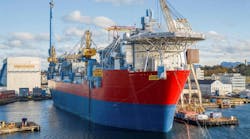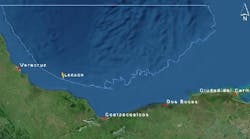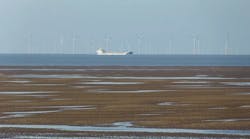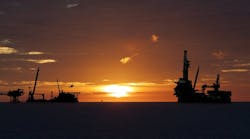Offshore staff
KUALA LUMPUR, Malaysia – MISC and Malaysian fabricator MMHE have delivered a semisubmersible floating production system for Sabah Shell Petroleum’s deepwater Gumusut-Kakap field development offshore Sabah.
TheGumusut-Kakap field is Malaysia’s second deepwater development after the Murphy-operated Kikeh oil field, also offshore Sabah.
The semi-FPS, claimed to be the largest such facility ever fully built and integrated on land, left the Malaysia Marine and Heavy Engineering yard in Pasir Gudang, Johor, on May 13. It sailed to Desaru waters where a sea trial and an inclination test were completed on May 24.
The platform then undertook a 1,480-km (919-mi) journey to arrive at the field on June 12.
Following installation (the moorings are already in place), this will be the largest offshore operating facility anywhere in Asia, according to one of Shell’s partners Petronas Carigali.
MISC as EPC contract holder performed the full project management scope.
SSPC is responsible for the offshore installation and commissioning activities. The semi-FPS, designed to remain on station for 30 years, will operate in a water depth of around 1,200 m (3,937 ft) and will be linked to 19 subsea wells gathered together via seven subsea manifolds.
The system is designed to process up to 150,000 boe/d, with a subsea pipeline taking the oil to the Sabah terminal onshore in Kimanis. In time the new platform could serve as a hub to tie in production from other accumulations in the area.
Petronas has formed a new subsidiary, Vestigo Petroleum, to focus on development and production activities from small, marginal, and mature fields in Malaysia and elsewhere.
Vestigo will seek to optimize production from clusters of small, marginal and mature fields through operational, technical and cost effective methods, while Petronas Carigali as parent company continues to explore and develop larger and more technically complex fields.
7/08/2013




